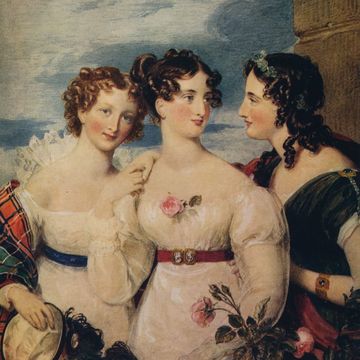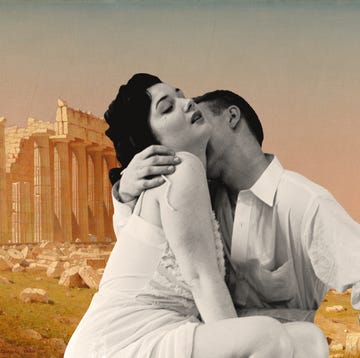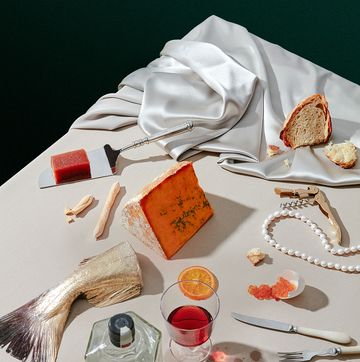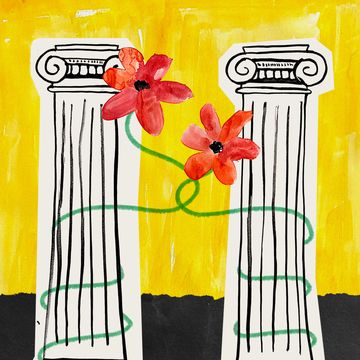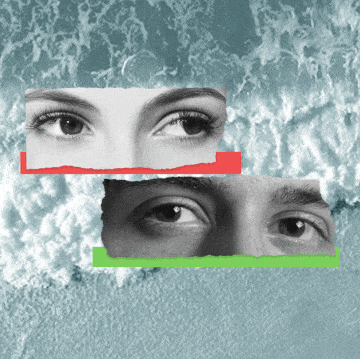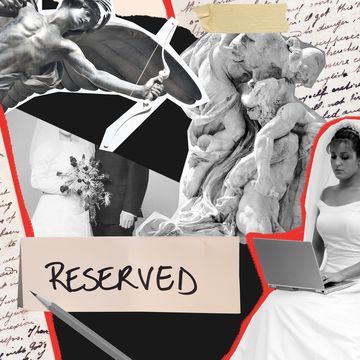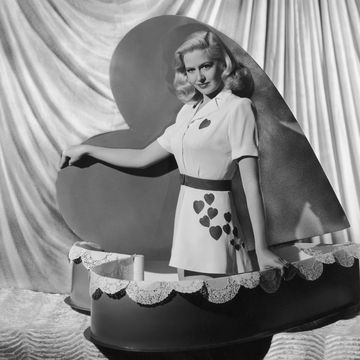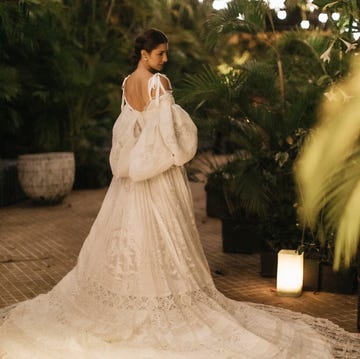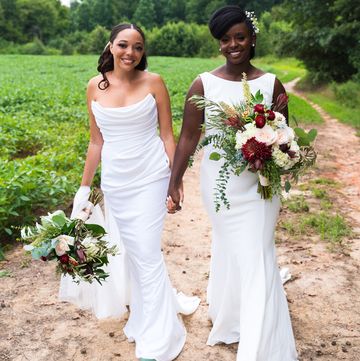I know it doesn't sound like a problem: "You're a man and you're obsessed with women? Have you considered running for president?!" But as a gay man, genetic emphasis on gay, my devotion to the opposite sex has occasionally verged on the extreme.
Of course, according to public perception of a gay man's official responsibilities, loving women is just my bedazzled cross to bear, the GBFF phenomenon being well documented, if only in its most base terms: Let's go shopping! You are so skinny right now, like, I'm nervous for you! But that cliché—gay men and straight women, soul mates of the surface and silly—oversimplifies a complex web of unspoken needs and desires.
In each other, both parties find a supposed emotional haven. It's like dancing three feet apart at a seventh-grade sock hop: They're touching, but at arm's length; they're slow dancing, but he knows all the lyrics to "Greatest Love of All." Yes, there is obviously some sort of attraction at hand, but the impossibility of ever crossing that line—sex—means they can bask in their magical love bubble with no sense of impending doom, or heartbreak, or binge eating.
But here's where my problem becomes a problem. For me, there's been a significant gray area between loving women as a gay man and just plain loving women. And the problem with that is I've made it a problem for everyone else, too.
For most of my life, my heart and my penis have been on strained speaking terms, like separated parents too religious to divorce. Before I came out, I tried desperately to force my organs to align, even losing my virginity to a girl who, as I boasted to my (straight) brothers, "looked just like Barbie!" (The only thing gayer than losing your virginity to a girl who looks like Barbie? Losing it to a dude.)
Related: What Matthew McConaughey Has to Do With Why We Lie Online
At 22, I made a fresh start, sleeping with every man in Manhattan (Hi, Mom and Dad!) and coming out to anyone who cared to listen. Suddenly, the female relationships that had been oddly tense due to my inability to consummate anything more than a "cuddle party" were remedied by three simple words: I. Am. Gay. Finally, I felt free, empowered, and, for the first time in my life, like I truly knew who I was.
Then I met Serena Merriman.
She was one of 16 strangers in an acting class I took my first year after college. My eyes went straight past my hot male classmates, all presumably very gay, to Serena, with her lion's mane of golden curls, her mischievous grin, her chic style. She looked like Grace Kelly in a wind tunnel. Apparently the curiosity was mutual. One day I was alone; the next, there was Serena.
She ran with a fast and fabulous crowd, hosting decadent parties at her parents' East Village loft, which sat right above The Cock, a seedy gay bar. These events attracted a who's who of I'm-beautiful-and-have-a-potential-drinking-problem types. And much to my surprise, she'd told them all about me.
A familiar scene began to play out: People would saunter over, eight vodkas deep, and slur, "Serena loves you, you know that, right?" I'd reply, "I love her, too." They'd get really close, the kind of close that calls for breath mints and/or restraining orders, and say, "Not like that, you don't. Not like that." And then they would throw up on my shoes. Cleaning off my Duckie Browns in the bathroom, I'd think, why not like that? Why can't I love her like that?
Serena knew I was gay, but as we became more enchanted with each other, I privately began to use less and less obvious language to define my sexuality with her. Maybe I was bisexual, maybe I was trisexual, maybe I was a tricycle. I had no idea what I was other than in love with her. Couldn't love transcend gayness? Couldn't my heart have a heart-to-heart with my anatomy?
After most parties, she and I would fall asleep spooning, wearing earplugs to drown out the relentless noise of The Cock. But one night, when the music was so loud neither of us could sleep, we sat tangled on the couch piecing together the night's sordid events, and I decided to test myself.
Related: What I've Learned About Being A Man, From Being Born Female
I kissed her. In that moment, it was as if all of New York went silent. It was just me and her. We were in love, and countless songs and movies told me that was all we needed. I could feel my heart beating. I could feel her heart beating. I could feel our bodies shaking. In fact, the whole room seemed to be shaking. Wait, it was shaking. It was The Cock.
The dance beats were blasting through the floorboards, seemingly more powerful than ever. I could feel it—all that gayness. All those men. All that unexplored life beneath my feet. I pulled away from Serena. "It will be impossible to sleep," I said. She nodded, more confused than ever.
In class that week, Serena was playing Maggie from Cat on a Hot Tin Roof, asking her character's husband, Brick, why he won't have sex with her. Was Brick in love with his recently deceased best friend? Had Maggie married a gay man? The irony was not lost on me.
Mid-scene, I noticed that Serena was gripping the back of a chair as if her life depended on it, odd behavior from the assured girl who usually commanded the room. Our teacher, Ron, noticed it too. "Serena, take your hands off the chair and keep going." She just stood there. "Take your hands off the chair, Serena." Her hands stayed. "Serena, take your hands off the chair and ask Brick why he won't have sex with you." Her grip got tighter. Ron pushed one more time, "Ask him, 'Why won't you have sex with me, Brick?'"
Finally, she peeled her hands away from the chair. She started to cry. The class gasped in excitement. In acting-school terms, sobbing in the middle of a scene is a "breakthrough," as if tears could unlock whatever fear has been inhibiting your inner Daniel Day Blanchett-Dench. But I knew this was not a breakthrough. This was a breakdown. And it was my fault.
When I was 11, my mother stuck a newspaper article on the fridge. It was about "I love you." The author warned that those words had a power that should never be used carelessly. At 11, having only said "I love you" to my immediate family and every dog I'd ever petted, I couldn't comprehend the hard truth on the freezer before me. But in that class, watching Serena, it became clear.
I love you. It's ownership. I take you. I am yours. But I couldn't own Serena. I couldn't love her fully, because three other words kept getting in the way.
I often joke that women are my cocaine: They get me high, make me talk fast, and are something I had to stop doing in my twenties. Ultimately, I realized that I really was using women like a drug—in that I was using them to avoid fully dealing with who I was. From women, I got the emotional connection I needed without the confusing complications of sex, while from men I got the opposite, without ever being in danger of getting hurt—which meant that I could escape both types of relationships unscathed. I was the fun-size Snickers of involvement: good but never enough.
Serena was the first person I ever met who I thought I wanted to give myself fully to, body and soul. Except I couldn't. And it hurt her. And that killed me.
On a rainy spring night nine months after we met, Serena and I "broke up." I told her I was gay, again (well, like always, but I told her again). Losing each other was a terrifying possibility, but it seemed like a better option than losing ourselves. As we said goodbye, I told her I loved her. Not in the way we both wished, but in the way that I actually meant.
Related: Going Blonde Overhauled My Sex Life
Before writing this, I call Serena to make sure my version of events matched hers. We talk on the phone often, as she's in New York and I now live in L.A. She was breastfeeding her newborn son, Nico, when she picked up.
Two years ago, Serena got married on her family's estate in Little Compton, Rhode Island. Having long since rebuilt our friendship on a much sturdier foundation, Serena asked me to be her man of honor. It was indeed an honor, but it also meant that for the whole ceremony I faced her back. For 15 of the most monumental minutes of my best friend's life, I couldn't see her face. Was she smiling, was she crying, was she gripping her flowers as she had that long-ago chair? Turn around so I can see you, I thought. Let me experience this with you! But in my line of vision was Marcos, Serena's handsome soon-to-be husband. I watched him gaze into her eyes as they exchanged vows. He loved her. In every way she should be loved. Don't turn around, Serena, I thought. Look forward.
On that phone call, Serena asks what's happening with the German. Last summer, I met a man who for the first time in a long time made me feel the same spark I'd felt when I met Serena. A German on holiday from Düsseldorf. I told him I loved him a week after we met. "How do you know?" he asked.
I imagined my heart and my penis finally hugging it out. "I just do."
A month later, I dropped everything and flew to Düsseldorf to be with him, even though I spoke no German and had no idea what I'd do once I got there. But six weeks after that, I was back in the U.S. for work, trying to figure out how to love someone from nearly six thousand miles away.
"Impossible things," I tell Serena. "My heart only wants impossible things."
"I remember," she says.
We get back to trading stories; at moments, it feels like we're lying next to each other in that downtown apartment, so happy, so confused, so mad at the raging bar downstairs.
But the present calls us back to reality. Nico cries out. "Oh, God, I have to go. Your godson just made the biggest poop." Nico is my godson.
"Every good thing comes with a little bit of shit," I say. We both laugh.
"I love you," she says.
"I love you too."
As I hang up, I can hear the baby making little noises. Nico. A boy we both can love.
This article appeared in the November 2014 issue of ELLE magazine.


